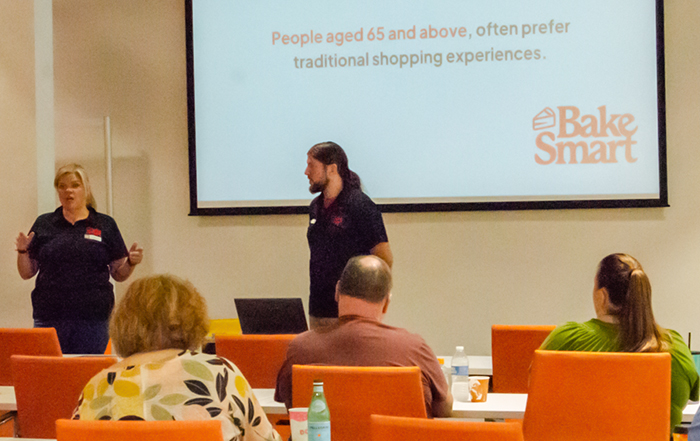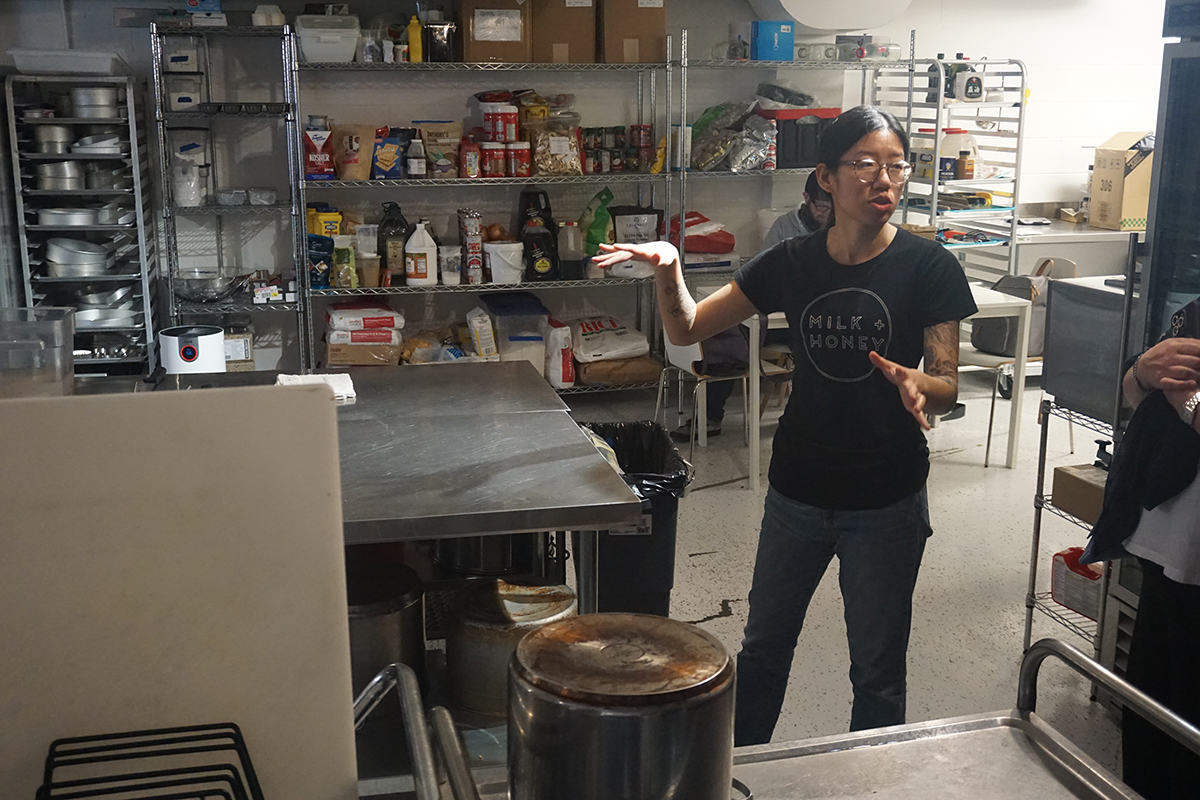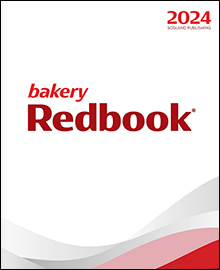The Retail Bakers of America (RBA) plays an important role in helping bakers stay up-to-date on the latest trends and developments in the industry, ultimately helping them thrive in a competitive marketplace. By providing support, resources and networking opportunities, it gives them the tools they need to run successful businesses.
To that end, the RBA recently teamed up with Dawn Foods for a summer RBA Roadshow, which took place July 22-23 in Jackson and Ann Arbor, Michigan. The purpose of this event, which was attended by bakery leaders from across the country, was two full days of networking, product demos and business panels at Dawn’s Innovation Studio in Jackson, in addition to bakery tours of a variety of successful businesses in the thriving Ann Arbor baking community.
“When it’s relative to the industry and helping other bakers, that’s what we want to do,” says Carrie Jones-Barber, chief executive officer of Dawn Foods. “We want to be in those positions to provide education, sharing and conversation . . . it’s all about helping our customers. They are so good at what they do, so how can we help them to be more successful?”
On the first day of the Roadshow, held at Dawn’s Innovation Studio, attendees got a chance to see what goes into the global bakery ingredient leader’s cutting-edge product development. Chef Melissa Trimmer, corporate executive pastry chef for Dawn, showed the ins-and-outs of the facility designed to function in stages — from concepting to development to scale-up.
Additionally, expert panels from the team at BakeSmart and Amy Emberling of Zingerman’s Bakehouse provided ways to create success in e-commerce and staff management.
E-commerce strategies

The first step to thrive in e-commerce is creating your store, says the team from BakeSmart.
| Source: Dawn FoodsWhile most bakeries are still brick-and-mortar operations, customers are increasingly moving online and will continue to do so for the foreseeable future. BakeSmart is a bakery management platform that streamlines operations, reduces cost, improves workflow and runs production processes. The BakeSmart team was on hand at the RBA Roadshow to discuss the importance of building e-commerce for bakeries.
“Convenience-enhancing options such as web or app-based ordering are no longer just an option – they’re a must-have,” they said.
One of the major benefits of having an accessible and easy-to-use e-commerce platform is that you’ll never miss a sale, even when your brick-and-mortar store is closed. Additional benefits include enticing customers to purchase more items per transaction than in-person, building strong customer loyalty/encouraging repeat business and increasing efficiency.
In 2023, BakeSmart helped its clients to process nearly 80,000 orders, totaling well over $4 million in sales. Slightly more than half of all online orders were over $50, with the top 25 percent of e-commerce customers having an average order value of $60.44.
The first step to e-commerce success is creating your store. Some things to think about in this process are organization and structure. This helps customers quickly find what they’re looking for. Multiple listings make it easier for customers to discover everything you have to offer. In order to capture all of the fresh and exciting offerings, you can create an easy and repeatable process of taking photos. You’ll need to start early and capture the final creations to really sell them online.
Another way customers will find your products is through search engine optimization (SEO), so think about tools that can help in this endeavor. This is where marketing comes into play. Focusing on local search results will help you to reach your true customer base. BakeSmart research finds that most customers will travel a maximum of twenty minutes to visit their favorite bakery. To ensure you’re taking advantage of SEO, update your Google listing with accurate business information, including address and hours. You can even personalize your profile with photos, offers, posts and more.
You’ll want to highlight convenience in ordering, as that has become paramount to retaining customers. BakeSmart says that you should promote click-and-collect – commonly referred to as “curbside pickup” or “buy online, pick up in store” – to emphasize convenience. You can also drive traffic to your e-commerce store with online-only discounts and promotions.
The ordering process itself will make-or-break your online store. Set your lead time to give your team enough time to successfully fulfill orders. By utilizing an automated system, you reduce the risk of errors and ensure orders are processed promptly.
Staff engagement

Amy Emberling of Zingerman's Bakehouse shares ways to create success with staff management.
| Source: Dawn FoodsZingerman’s Delicatessen opened on March 15, 1982. Since that time, it has become an Ann Arbor institution and one of the country’s leading specialty food stores. This success has helped it to grow into the Zingerman’s Community of Businesses, which employs over 700 full-time and part-time people. Around the December holidays, that number can swell to nearly 1,000.
One significant piece of the Zingerman’s puzzle is the Bakehouse. It was founded in 1992 by Frank Carollo and Zingerman’s Delicatessen founders, Ari Weinzweig and Paul Saginaw, with the intention of baking their own bread in house for the deli. Today, the artisanal retail and wholesale bakery and baking school is co-managed by Amy Emberling and Jaison Restrick.
At the RBA Roadshow, Emberling shared how you can really make a difference with staff engagement. The key to this is servant leadership, which prioritizes the well-being and growth of employees and the community, rather than simply money. Instead of thinking of the organization as a top-down approach starting with CEOs and managers, the servant leadership model starts with customers, then front line staff and supervisors, with managers and CEOs at the bottom.
According to Emberling, there are six responsibilities of an effective servant leader: provide vision, give great service to staff, manage in an ethical manner, learn and teach, help staff succeed and say thanks. Zingerman’s founders wanted to invite everyone to help run the business and convey that every person was responsible for its success. Their goal was to build an organization where decisions would not be based on who had the most authority but on whoever had the most relevant information.
Training is a critical step in this process, putting staff on the right path to success. As part of the Training Compact, a trainer agrees to document clear performance expectations, provide training resources, recognize and reward performance, while the trainee agrees to take responsibility for the effectiveness of their training.
Communication is also important. The company regularly conducts open meetings and staff surveys to gauge how things are going and if there’s anything that can be done more effectively. Benefits of great staff engagement include better work and decisions, improved bottom line, reduced turnover, increased average tenure, higher morale, more fun and less stress for managers.
Zingerman’s Community of Businesses has an extra level of incentive, as it has been employee-owned since 2017. This fosters the emotional and spiritual benefit of actual ownership. It allows employees to share in the reward, risk, responsibility and opportunity of an owner. Ultimately, it creates more opportunity for cross-business inspiration and innovation.
Zingerman’s overall model of staff engagement may not be the best fit for every organization. Implementation can be a big cultural shift for employees. It also requires learning, development, time and effort, which can be a significant opportunity cost. It also creates high culture expectations from staff, which can be difficult to maintain. That being said, for businesses like Zingerman’s which have implemented it effectively and maintained that to a high level, it can be extremely rewarding.
Not too sweet

Rachel Liu Martindale of Q Bakehouse gives a tour of her kitchen space on the second day of the RBA Roadshow in Ann Arbor.
| Source: Sosland Publishing Co.In addition to the Roadshow’s second-day visits to Zingerman’s Bakehouse and Sweet Heather Anne (which specializes in artistic wedding and milestone event cakes), one of the stops on the bakery tour was Q Bakehouse & Market. This neighborhood Asian-American bakery and market nestled on the west side of Ann Arbor, Michigan offers small batch pastries, cakes and prepared food made by hand with seasonal ingredients.
Rachel Liu Martindale is a Taiwanese-Chinese American and University of Michigan alum who has a degree in engineering. Suffering from burnout in the corporate world, the self-taught baker left her job to pursue her passions in the food and beverage industry.
After completing an internship at the aforementioned Sweet Heather Anne, Martindale made her first professional cake in the spring of 2017, and thus her business Milk + Honey was born. For a few years it was a side business, which turned into weekly pop-ups in downtown Ann Arbor, before eventually settling in to its first commercial location in Milan, Michigan in January 2020 – right before the world changed.
Milk + Honey weathered the storm of the COVID-19 pandemic, and after five years in business, it rebranded to Q Bakehouse & Market, keeping the cakes and expanding to offer Asian-inspired pastries and foods to reflect Martindale’s heritage. There are many standouts on the menu, including the coffee bun, which features a milk bread bun with coffee pastry cream and a coffee cookie topping. Another item that wowed those in attendance at the tour was the chili crisp scone, made with sharp white cheddar, scallions and chili crisp.
Q is a Taiwanese culinary term used to describe the sought-after bouncy, springy and elastic texture of handmade noodles, mochi, tapioca pearls in boba tea and rice cakes. It’s a texture that is beloved in Taiwanese and Chinese cultures, describing both sweet and savory foods. Saying something is Q is equivalent to the compliment of “not too sweet.”






